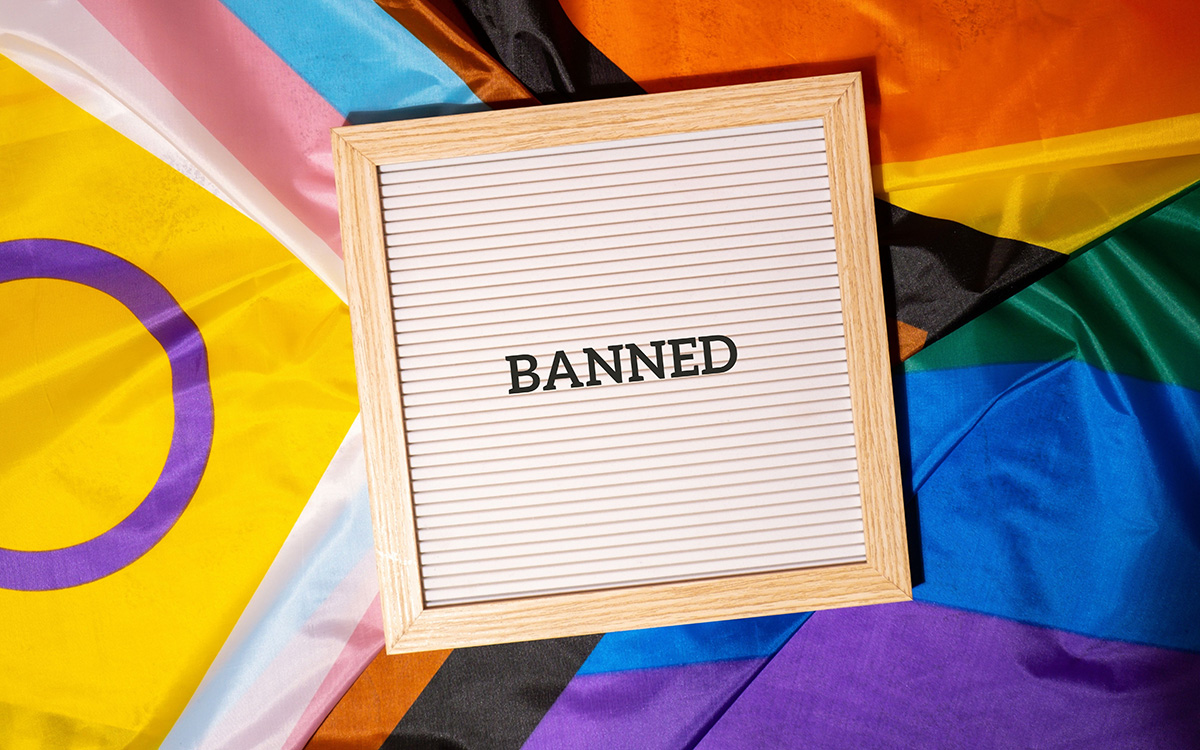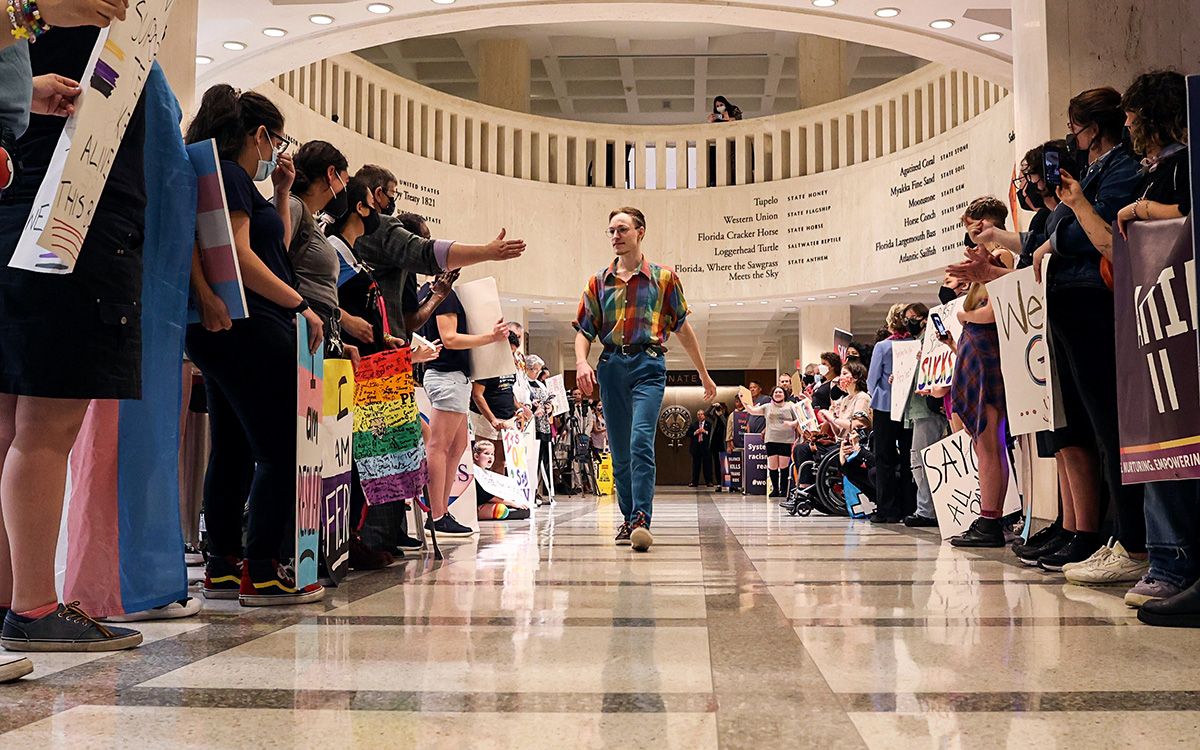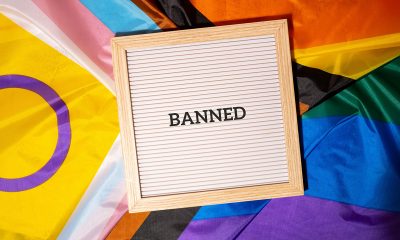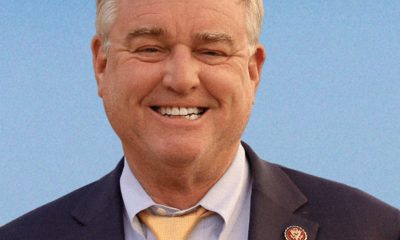National
Lesbian student rejects plea in sex-with-minor arrest
Thousands sign petition urging Florida prosecutor to drop case


Kaitlyn Hunt, 18, faces 15 years in prison for a consensual relationship with a younger teen. (Photo courtesy of Facebook)
An 18-year-old lesbian arrested in February for having consensual sex with her then 14-year-old girlfriend and high school classmate has rejected an offer by a Florida prosecutor to lower the charge against her in exchange for a guilty plea.
At the advice of her lawyers and parents, Kaitlyn Hunt turned down an offer to plead guilty to third-degree felony child abuse, even though the charge doesn’t require her to be listed as a sex offender and the prosecutor promised to recommend she be sentenced to home detention rather than time in prison.
She is currently charged with two counts of lewd or lascivious battery, a second-degree felony that carries a possible sentence of 15 years in prison and lifelong registration as a sex offender.
“Our client is a courageous teenager who is choosing not to accept the current plea offer by the State of Florida,” said defense attorneys A. Julia and Joseph Graves in a statement released to the media.
“This is a situation of two teenagers who happen to be of the same sex involved in a relationship,” the attorneys said. “If this case involved a boy and a girl, there would be no media attention to this case.”
Hunt’s decision to reject the plea offer came after more than 100,000 supporters from throughout the U.S. and several other countries signed an online petition initiated by her parents calling for the prosecutor to drop the case.
In response to a campaign started by her father, Steven Hunt Jr., and her mother, Kelley Hunt Smith, about 30,000 supporters joined a Facebook group called Free Kate.
The prosecutor, State Attorney Bruce Colton of Indian River County in central Florida, said his office has no plans to drop the charge. He took exception to claims by Hunt’s supporters that Hunt was singled out because of her sexual orientation, saying his office would have filed the same charge if an 18-year-old male had a sexual encounter with a 14-year-old girl.
“If one person is over the age of 18 and the other is between the age of 12 and 16, that’s the crime, regardless of the sex of either or both of them,” the New York Times quoted Colton as saying.
“The State Attorney’s Office tendered an extremely lenient plea offer in this case which would have ensured the defendant avoided any term of incarceration and the stigma of being labeled a sex offender,” Colton said in a statement released on May 24. “In fact, in all probability, the defendant would have avoided being a convicted felon.”
Hunt’s parents and supporters said that under the plea offer, a judge would have the option of rejecting the prosecutor’s recommendation and could hand down a sentence of as much as five years in prison.
Colton said the case is now scheduled to go to trial in mid-July. Observers said the younger girl would likely be called as a witness and asked about the intimate details of her sexual relations with Hunt.
Hunt’s parents disclosed in a statement posted on Facebook and in the online petition that the arrest of their daughter was initiated by the parents of the younger girl, whose name has been withheld from the public court record because she’s a minor.
According to Hunt’s parents and lawyers, the other girl’s parents contacted the county sheriff’s office after learning their daughter was in a romantic relationship with an older girl she met in school and that the relationship involved sex.
“They are out to destroy my daughter because they feel like she ‘made’ their daughter gay,” Hunt’s mother, Kelly Hunt Smith, said in the petition.
“They see being gay as wrong and they blame my daughter,” she said. “Of course, I see it 100 percent differently. I don’t see or label these girls as gay. They are teenagers in high school experimenting with their sexuality – with mutual consent. “
Added Smith, “And even if their daughter is gay, who cares? She is still their daughter.”
Hunt’s parents and friends point out that Hunt was a member her school’s women’s basketball team, where she met her girlfriend, and sang in the school choir. They note that at the request of the younger girl’s parents, school officials expelled Hunt, preventing her from graduating with her class this year.
An arrest affidavit filed in court says the younger girl told a detective with the Indian River County Sheriff’s Office that she and Kaitlyn Hunt began dating in November 2012, three months after Hunt turned 18 in August 2012, and while she was 14 and a freshman. Hunt was a senior, authorities said.
The affidavit says the younger girl told the detective the two began having sexual relations “before Christmas 2012” and the sex continued through January 2013. It says the younger girl disclosed their first sexual encounter took place in a bathroom at Sebastian River High School, where the two went to school.
On at least one occasion, the two had sex in Hunt’s bedroom at her parents’ home in Sebastian, Fla., a community located near the City of Vero Beach, the affidavit says.
It says that the younger girl cooperated with sheriff’s investigators by agreeing to their request that she allow investigators to record a phone conversation she initiated with Hunt. The affidavit says the younger girl asked about their sexual encounters during the conversation, prompting Hunt to acknowledge that the sexual encounters took place.
Based on that “controlled phone call,” as the affidavit calls it, the Sheriff’s detective arrested Hunt on Feb. 16. It says Hunt waived her Miranda right to remain silent and admitted to the detective that she and the younger girl engaged in consenting sex.
“Your affiant asked Kaitlyn if she knew it was wrong to have sex with [the younger girl] due to [her] being 14 years old,” the affidavit says. “Kaitlyn stated she didn’t think about it because [the younger girl] acted older.”
“This is an outrageous misapplication of the law that will destroy the lives of two high school teenagers while doing nothing to serve justice,” said Nadine Smith, executive director of the state LGBT rights group Equality Florida.
“We hold out hope that common sense will prevail and the damage that already has been done will be mitigated by halting any felony prosecution,” Smith said in a statement.
“Equality Florida is also reaching out to Florida lawmakers to address the failings of the law that criminalizes high school students and is too often used by parents who object to the race, ethnicity or gender of the schoolmate their teenager is dating,” she said.
National
From LGBTQ book bans to internet bans: A bipartisan attack on knowledge
Online safe spaces for queer youth increasingly at risk

“They had LGBTQ-inclusive books in every single classroom and school library,” Maxx Fenning says of his high school experience. “They were even working on LGBTQ-specific course codes to get approved by the state,” he said, describing courses on queer studies and LGBTQ Black history.
No, Fenning didn’t grow up in Portland or a Boston suburb. Fenning graduated from a South Florida high school in 2020. Florida’s transformation from mostly affirming to “Don’t Say Gay” has been swift, he says. “It feels like a parallel universe.”
Fenning, who just graduated from the University of Florida, follows the developments closely as the executive director of PRISM FL Inc., a youth-led LGBTQ nonprofit he founded at 17. “I’ve watched so many of the things that I kind of took advantage of be stripped away from all of the students that came after me,” Fenning says. “It’s one thing to be in an environment that’s not supportive of you. It’s another thing to be in an environment that’s supportive of you and then watch it fall apart.”
“It’s just gut-wrenching,” Fenning explained, describing how Florida’s increasingly hostile legislation has transformed the state he has lived in most of his life.
Most recently, Florida passed HB3, “Online Protections for Minors,” which bans youth under 14 from having social media accounts. Youths aged 14 and 15 need parental consent before getting accounts and any minor must be protected from “harmful content” online.
Unlike the previous legislation, which came predominately from the right and directly targeted issues like gender-affirming healthcare or DEI, HB3 is part of a bipartisan push across the country to regulate social media, specifically for youth. HB3 was co-sponsored by Michele K. Rayner, the openly queer Black member of the Florida Legislature, alongside many of her colleagues across the aisle. Similar national legislation, like Kids Online Safety Act, includes 68 Democratic and Republican sponsors.
Shae Gardner, policy director at LGBT Tech, explains that this legislation disproportionately harms LGBTQ youth, regardless of intentions or sponsors.
Gardner says that while all these bills claim they are for the safety of kids, for LGBTQ youth, “you are putting them at risk if you keep them offline.” She explains that “a majority of LGBTQ youth do not have access to affirming spaces in their homes and their communities. They go online to look like that. A majority say online spaces are affirming.”
Research by the Trevor Project, which reports that more than 80% of LGBTQ youth “feel safe and understood in specific online spaces” backs this up. Specific online spaces that are under target from legislation, like TikTok, are disproportionately spaces where LGBTQ youth of color feel safest.
“For LGBTQ people, social media has provided spaces, which are, at once both public and private, that encourage, and enhance … a great deal of self-expression that is so important for these communities,” confirms Dr. Paromita Pain, professor, Global Media Studies & Cybersecurity at University of Nevada, Reno. She is the editor of the books “Global LGBTQ Activism” and “LGBTQ digital cultures.”
Fenning emphasizes that with bills like “Don’t Say Gay,” in Florida — and other states including North Carolina, Arkansas, Iowa, and Indiana — LGBTQ youth have less access to vital information about their health and history. “Social media [are] where young people increasingly turn to get information about their community, their history, their bodies and themselves.”
At PRISM, Fenning works to get accurate, fact-backed information to Florida youth through these pathways, ranging from information on health and wellbeing to LGBTQ history to current events. The feedback has been overwhelmingly positive. Often youth tell him “I wish I learned this in school,” which is a bittersweet feeling for Fenning since it represents how much young LGBTQ youth are missing out on in their education.
Morgan Mayfaire, executive director of TransSOCIAL, a Florida advocacy group, said that these internet bans are an extension of book bans, because when he was a teen, books were his pathway into the LGBTQ community. “For me it was the library and the bookstores that we knew were LGBTQ friendly.” Now 65, Mayfaire understands that “kids today have grown up with the internet. That’s where they get all their information. You start closing this off, and you’re basically boxing them in and closing every single avenue that they have. What do you think is going to happen? Of course, it’s going to have an impact emotionally and mentally.”
Fenning says that social media and the internet were powerful to him as a teen. “I was able to really come into my own and learn about myself also through social media. It was really powerful for me, building a sense of self.” Gardner agrees, sharing that legislation like this, which would have limited “15-year-old me, searching ‘if it was OK to be gay’ online, would have stagnated my journey into finding out who I was.”
Gardner also explains that many of the bills, like HB3, limit content that is “harmful” or “obscene” but do not specifically define what that content is. Those definitions can be used to limit LGBTQ content.
“Existing content moderation tools already over-censor LGBTQ+ content and users,” says Gardner, “they have a hard time distinguishing between sexual content and LGBTQ+ content.” Pain emphasizes that this is no accident, “there are algorithms that have been created to specifically keep these communities out.”
With the threat of fines and litigation from HB3, says Gardner, “moderation tools and the platforms that use them is only going to worsen,” especially since the same legislators may use the same terms to define other queer content like family-friendly drag performances.
In addition to being biased, it has devastating effects on LGBTQ youth understanding of their sense of identity, Fenning explains. “That perception of queer people as being overly sexual or their relationships and love being inherently sexual in a way that other relationships aren’t does harm to our community.”
Gardner acknowledges that online safety has a long way to go — pointing to online harassment, cybercrime, and data privacy—but that these bills are not the correct pathways. She emphasizes “everybody’s data could be better protected, and that should be happening on a federal level. First and foremost, that should be the floor of protection.”
She also emphasizes that content moderation has a long way to go from targeting the LGBTQ community to protecting it. “Trans users are the most harassed of any demographic across the board. That is the conversation I wish we were having, instead of just banning kids from being online in the first place.”
Being queer on the ground in Florida is scary. “The community is very fearful. This [legislation] has a big impact on us,” explains Mayfaire.
“I mean, it sucks. Right?” Fenning chuckles unhappily, “to be a queer person in Florida. In a state that feels like it is just continuously doing everything it can to destroy your life and all facets and then all realms.”
Despite the legislative steamrolling, several court wins and coordinated action by LGBTQ activists help residents see a brighter future. “There’s a weird tinge of hope that that has really been carrying so many queer people and I know myself especially this year as we’re seeing the rescinding of so many of these harmful policies and laws.”

For example, this March, Florida settled a challenge to its “Don’t Say Gay” legislation that significantly lessens its impact. Already, experts warn that HB3 will face legal challenges.
Pain emphasizes that social media is central to LGBTQ activism, especially in Florida. “There have been examples of various movements, where social media has been used extremely effectively, to put across voices to highlight issues that they would not have otherwise had a chance to talk about,” she says, specifically citing counteraction to “Don’t Say Gay.” That is another reason why legislation like this disproportionately harms LGBTQ people and other minority groups, it limits their ability to organize.
Fenning emphasizes that HB3 directly attacks spaces like PRISM, which do not just share information for the LGBTQ community, but provide spaces for them. “Foundationally it provides an opportunity for the community,” he says, but more than anything, it provides a space, where “you can you can learn from your queer ancestors, so to speak, and take charge.” And that is invaluable.
(This story is part of the Digital Equity Local Voices Fellowship lab through News is Out. The lab initiative is made possible with support from Comcast NBCUniversal.)
The White House
EXCLUSIVE: White House Press Secretary Karine Jean-Pierre on speaking out and showing up
On the two-year anniversary of her appointment, she says, ‘representation matters’

Karine Jean-Pierre sat down with the Washington Blade for an exclusive interview in her office on Tuesday, a week before the two-year anniversary of her appointment as America’s first Black and first openly queer White House press secretary.
Her history-making tenure has come at an especially fraught time for LGBTQ people.
The Biden-Harris administration has been widely celebrated as the most pro-equality in history. Over the past four years, rights and freedoms were expanded through the passage of landmark legislation and the enactment of bold new policies by federal agencies like the FDA and U.S. Department of Education, while the president elevated record-breaking numbers of LGBTQ appointees to serve in the highest levels of government.
At the same time, conservative Republicans have led an unprecedented legislative assault on queer people, especially transgender and gender-expansive youth, which has been accompanied by an escalation of dangerous fear and hate-mongering rhetoric against the community and spikes in bias-motivated acts of violence as well as depression, anxiety, self-harm behaviors, and deaths by suicide.
On these matters Jean-Pierre has often spoken out, addressing reporters from the lectern in the West Wing’s James S. Brady Press Briefing Room in remarks that have often gone viral and driven news coverage.
Reflecting on her tenure, the 49-year-old press secretary explained why she is uniquely positioned to leverage her influence as the most visible spokesperson for President Joe Biden, Vice President Kamala Harris, and the administration — at this pivotal moment for LGBTQ people both at home and abroad.
Leadership comes from the top
“Representation matters,” Jean-Pierre said. “And the president was certainly very aware of that, and wanted to make sure that he put together the most diverse administration,” she said, “and he did that.”
About 14 percent of appointees in the Biden-Harris administration identify as LGBTQ, including U.S. Transportation Secretary Pete Buttigieg and Adm. Rachel Levine, assistant secretary for health at the U.S. Department of Health and Human Services. In his first term, Biden has appointed a record-breaking 11 LGBTQ judges to the federal bench, tying with the number who were confirmed under former President Barack Obama over the course of eight years.
“I am in this job because the president of the United States believed and wanted me to speak on behalf of him and said, ‘You have my voice, and you know how to speak for me, and this is the role that I want’ — I mean, that’s why he chose me,” she said.
Jean-Pierre stressed that she is able to condemn “these bad bills, these awful bills, these really hateful, prejudiced, anti-LGBTQ+ bills” because of “this president” — and not just by virtue of his appointment of her to the role of press secretary, but also because “he believes it is important to speak out.”
“Silence is complicit,” she said. “You know, that’s something that you hear from this president all the time: We cannot be silent in this moment. We cannot. Not when we see these anti-LGBTQ+ bills” nor when attempts are made to restrict reproductive rights or other freedoms.
When vulnerable queer youth are being targeted, Jean-Pierre said, “we have to do everything that we can — as an administration, as the White House, as the federal government — to protect them, and that’s what I get to do” because “this president allows me to speak out and show up.”
Jean-Pierre also pointed to Biden’s remarks in defense of the LGBTQ community and other marginalized groups during his State of the Union addresses and other major speeches.
“One of the things that he has said that always touches me is he says, ‘trans kids are some of the most impressive, brave people’ that he has seen,” she said. The president understands that “This is not about politics. This is about the right thing to do. And protecting lives.”
“And I say all of this to say it matters. It matters who sits behind that Resolute Desk. It matters who’s the president of the United States,” Jean-Pierre said.
The press secretary added that Biden’s actions as president affirm his verbal commitments to protect, support, and defend the LGBTQ community.
“The president signed an executive order to make sure that we were lifting up LGBTQ+ rights on the federal level, to make sure that policies that we were putting out there were taking steps toward protecting families, protecting youth, addressing mental health amongst young people, and in the community, and that was something that was really important for the president to do.”
She described a pivotal moment in the White House when, after the U.S. Supreme Court struck down Roe v. Wade’s constitutional protections for abortion with a 6-3 ruling in Dobbs v. Jackson Women’s Health Organization (2022), conservative Justice Clarence Thomas signaled his interest in revisiting other cases, including those that established the right to marriage equality.
“So, one of the things that came out of Congress in a bipartisan way was protecting marriage, protecting marriage equality,” Jean-Pierre said, “and I remember when the president signed [the Respect for Marriage Act] in December of 2022, and how beautiful that was knowing that that was protected by law.”
“We have made sure to do what we can on the federal level,” she added, noting that, “Obviously, there’s legislation that we have to continue to push for,” including the Equality Act — which would codify nondiscrimination protections for LGBTQ Americans — “but we do what we can from this side of things.”
The importance of diversity of lived experience
The president also understands the value of narrative storytelling in policymaking and governance, Jean-Pierre said, noting how Biden often talks about economic issues by relating to the struggles of working families with his journey from humble beginnings in Scranton, Pa.
Likewise, Jean-Pierre said that drawing from her lived experiences “helps me understand policy a little bit more and telling stories around policies a little bit more.” For example, she sees the danger of anti-LGBTQ laws targeting youth not just because of her identity as a member of the community — but also as the mother of a nine-year-old.
In February, Jean-Pierre spoke out repeatedly after a nonbinary Oklahoma teen named Nex Benedict died, in what was later ruled a suicide, after enduring months of bullying over their sexual orientation and following their state’s passage of a bill prohibiting trans students from using restrooms and facilities consistent with their gender identity.
“I know that for many LGBTQ+ students across the country this may feel personal and deeply, deeply painful,” Jean-Pierre said in remarks to reporters during the opening (the “topper”) of her press briefing on Feb. 23.
“Nex Benedict and so many young people are dying by suicide,” she told the Blade. “And that hurts. That’s an incredibly hurtful thing. Because they were bullied, because they were attacked, because they don’t feel free.”
“As a parent, as a mom, I do everything that I can to make sure that [my daughter] is protected,” Jean-Pierre said. “And what I want for my child, I want for every child, so that does hit differently, because it’s very personal.”
The press secretary recalled how she met two mothers at an event last year and, in separate conversations with the women, learned how they planned to leave their respective home states — Texas and Oklahoma — because they had trans children and felt unable to protect them amid the legislative attacks.
“Can you imagine,” she asked, “you’re raising your child in a community that you are familiar with” when suddenly, “there is a piece of legislation that’s going through the state legislature that gets signed by the governor and it is telling you that your child is in danger?”
Jean-Pierre also recognizes how her professional background and experience have equipped her for the briefing room and other duties of her role as White House press secretary.
Prior to joining Biden’s 2020 campaign and then the Biden-Harris administration, she worked as a political analyst for NBC News and MSNBC, having also served as a senior adviser and national spokesperson for MoveOn, the progressive public policy advocacy group.
Jean-Pierre began her career working on political campaigns and fundraising before joining the faculty of her alma mater, Columbia University, where she was a lecturer in international and public affairs.
“There’s something to growing and experiencing and taking chances and jumping from one thing to another,” she said, “understanding that you’re learning from the last thing and what you’re learning from the last thing you’re going to take to the next experience.”
The president, Jean-Pierre said, “had watched me do TV and watched me in my roles prior, and really believed that I was the person that he wanted” for the press secretary role.
Ultimately, “whether it’s making sure I am empathetic, sympathetic to what people are going through as a mom, as someone that belongs to multiple communities, I get to do that. Whether it’s the media and understanding how the media works, how TV works, how communicating with the press works, I’ve done that, so I’m able to bring that to the podium,” she said.
‘Lifting up issues that matter‘
In the immediate aftermath of Benedict’s death, Jean-Pierre noted that LGBTQ advocacy groups and individuals had sought to “get more attention to what happened there,” while the Biden-Harris administration wanted folks to understand “that we’re watching, we’re seeing what is happening, and we’re going to speak” about it.
“We’re not going to be silent, here,” she said. “We were very purposeful about it.”
In hindsight, Jean-Pierre said, her remarks from the podium made a real impact. “It brings coverage; it brings the White House press corps and others to cover what we’re saying. That is why it is so important what we do at the podium; it is so important what we do in this press briefing room — lifting up issues that matter to the American people.”
The press secretary added, “sometimes it’s not even an issue that’s popular. It’s something that needs to be spoken to, because it is something that could lead to a dangerous situation; something that could oppress a community, harm a community — and we get that; this president gets that, this administration gets that.”
Initially, there was very little press coverage of Benedict’s death, Jean-Pierre said, but “we wanted to really lift up what was happening,” because “it wasn’t just Nex Benedict. It was a story of many, many people in that community who were being bullied, who were being attacked. And we needed to speak to that” especially amid the hundreds of bills targeting the rights of queer youth in Oklahoma and across the country.
In another instance recalling her comments from the briefing room, Jean-Pierre stressed how it was important for the administration to “take on the governor” of Florida, Ron DeSantis (R), over his efforts to target the LGBTQ community by banning books, imposing curriculum restrictions, and limiting educators’ ability to be out at work.
Doing what’s right — regardless of the backlash
Jean-Pierre was quick to brush aside the question of whether she considers the risk of incurring backlash from the right when deciding whether to speak out on matters of LGBTQ rights.
Blowback “happens all the time,” she said. “Every day!” So, “I just don’t pay attention to it. We have to do the right thing and we can’t live in fear, here.”
The choice to be silent about a problem is the choice to be complicit, and not only does silence forestall any progress toward addressing the issue at hand, but it also constitutes an abrogation of one’s responsibility as a leader, Jean-Pierre said.
“The president is very clear about that,” she said. With respect to issues like dangerous anti-LGBTQ legislation, “you can’t be silent” because “people’s lives are at stake.” Ultimately, “The backlash is going to be the backlash, but we’ve got to do the right thing and history will remember where we stood.”
The Biden-Harris administration believes this principle extends to America’s leadership on the international stage, Jean-Pierre said, in her response to a question about U.S. Rep. Tim Walberg’s (R-Mich.) travel to Uganda last year to speak in defense of the country’s draconian Anti-Homosexuality Act.
She stressed that the law, which criminalizes homosexuality and imposes the death penalty in some cases, is “dangerous and undermines the rights of all citizens. And the president has been very clear, the Biden-Harris administration has been very clear, that no one should live — and I’ve said this before — in constant fear.”
Rather, Jean-Pierre said, “They should feel safe in their community, they should feel protected, and no one should be subjected to violence and discrimination. It is not what we believe, whether it’s here in this country or abroad.”
Since the legislation was made effective in May 2023, she noted, “we’ve taken several accountability actions, including restricting visa entry to the United States, restricting economic support to the government, and sanctioning officials who abuse human rights.”
Jean-Pierre added that, “we’re also deeply troubled by the copycat anti-LGBTQ+ legislation around the world,” which is “why it’s important what we do as the United States, because we’re leaders. And when you’re seeing other countries trying to implement and copycat the same thing, you need the United States to stand up and speak out against it. And that’s leadership.”
The administration’s robust response “sends a message around the world, that we do believe in human rights; we do believe that people should be protected; we do believe that violence and discrimination is not OK,” Jean-Pierre said. “And we lead by example.”
Likewise with respect to her comments from the podium, she said. “And [those remarks] went viral, because we spoke to it very loudly, very clearly,” in what was “an important moment for the community here but [also for] the community abroad, to hear from us, [that] we’re not afraid to talk about this because we have to and we understand our role in the world.”
The White House
Jane Rigby awarded Presidential Medal of Freedom

Sitting among a diverse and venerable group of Americans from every walk of life on the dais in the East Room of the White House on May 3 was lesbian and NASA astrophysicist Jane Rigby, awaiting her turn to be honored by President Joe Biden who would bestow the Presidential Medal of Freedom, the nation’s highest civilian honor, on her.
Rigby, an astronomer who grew up in Delaware, is the chief scientist of the world’s most powerful telescope who alongside her team operating NASA’s James Webb Space Telescope, studies every phase in the history of the universe, ranging from the first luminous glows after the Big Bang, to the formation of solar systems capable of supporting life on planets like Earth, to the evolution of the solar system.
A member of Penn State’s Class of 2000, Rigby graduated with a bachelor’s degrees in physics and astronomy. She also holds a master’s degree and a PhD in astronomy from at the University of Arizona. Her work as the senior project scientist for NASA’s Webb Telescope includes studies on how galaxies evolve over cosmic time and she has published more than 140 peer-reviewed scientific papers.
Rigby was named to Nature.com’s 2022 list of 10 individuals who shaped science and to the BBC’s list of 100 inspiring and influential women in the same year. Rigby had postdoctoral fellowships at Carnegie Observatories in Pasadena, Calif., before landing her job at Goddard Space Flight Center. In 2013 Rigby was awarded the Robert H. Goddard Award for Exceptional Achievement for Science.
A founding member of the American Astronomical Society’s Working Group on LGBTQ Equality in January 2012, now called the Committee for Sexual Orientation and Gender Minorities in Astronomy, Rigby serves as its Board Liaison until her term expires this June.
The lesbian astrophysicist in an interview for SGMA’s website spoke about her experiences including coming out:
“I’ve been out since 2000. My story’s simple — I fell in love with a fellow grad student in the department. It was a close-knit department, so hiding would have been ludicrous. Nor did I want to hide the best thing in my life! So, we were out as grad students. I certainly heard people say awful homophobic things at work there. They weren’t directed at me, and they weren’t said by people with power over me. If I recall, I was much less afraid of homophobic discrimination at work, than I was afraid of the two-body problem, and the lack of support we would receive as a same-sex couple in astronomy. That fear turned out to be justified. I’ve seen numerous different-sex couples get a wide range of support in solving the two-body problem, which was never offered to us,” she told the interviewer.
She reflected on American astronaut and physicist Sally Ride, her childhood role model who had an impact on her career:
“One of my biggest role models when I was young was Dr. Sally Ride. A few years ago, on her deathbed, Dr. Ride chose to write in her obituary that her life partner had been a woman. Dr. Ride was the most influential woman scientist when I was growing up — the person that made me say, “I want to do THAT when I grow up.” It was because of her that I realized that astrophysics was a profession, that physics was a subject girls could study, that NASA needed astrophysicists. So I’m so … amused, I suppose, that Sally Ride was this influence on my life’s path, at a time when I was completely unaware that it was even possible to *be gay* — and at the same time, she was gay, in love, and deeply closeted to keep her job.”
The interviewer noted that “for some women being gay is a cause for concern at the work place. Some say they were unsure about how to turn their sexual orientation into a positive aspect of their work persona.” Then asked Rigby what is your view on this?
“My experience is that absolutely I am a *better* astronomer because I’m queer. For a few reasons. First, I see things different than my colleagues. On mission work, as we weigh a decision, my first thought is always the community impact: ‘If we do things this way, who benefits, and who gets left out in the cold?’ Will this policy create inclusion, or marginalization? I think about science in terms of community-building. What team do we need to tackle a given science problem, with skills that are different from mine? Absolutely I think that way because I’m an outsider, because I’ve been marginalized. And because community-building is central to LGBTQ culture,” she said.
Editor’s note: You can read Rigby’s complete SGMA interview here: (Link)
Married to Dr. Andrea Leistra, Rigby, her wife and their young child reside in Maryland not far from her workplace at the NASA Goddard Space Flight Center in suburban Washington and when not studying the universe is often found on the neighboring Chesapeake Bay wind boarding, a favored pastime.
Also honored in the ceremony Friday were a former U.S. vice president, a civil rights worker and martyr, two former Cabinet secretaries — one a former U.S. secretary of state, a speech writer for the late Dr. Martin Luther King Jr., an Olympian and gold medalist, and one of the most powerful woman political leaders and the speaker emeritus of the U.S. House of Representatives, among others, and LGBTQ advocate Judy Shepard.

















